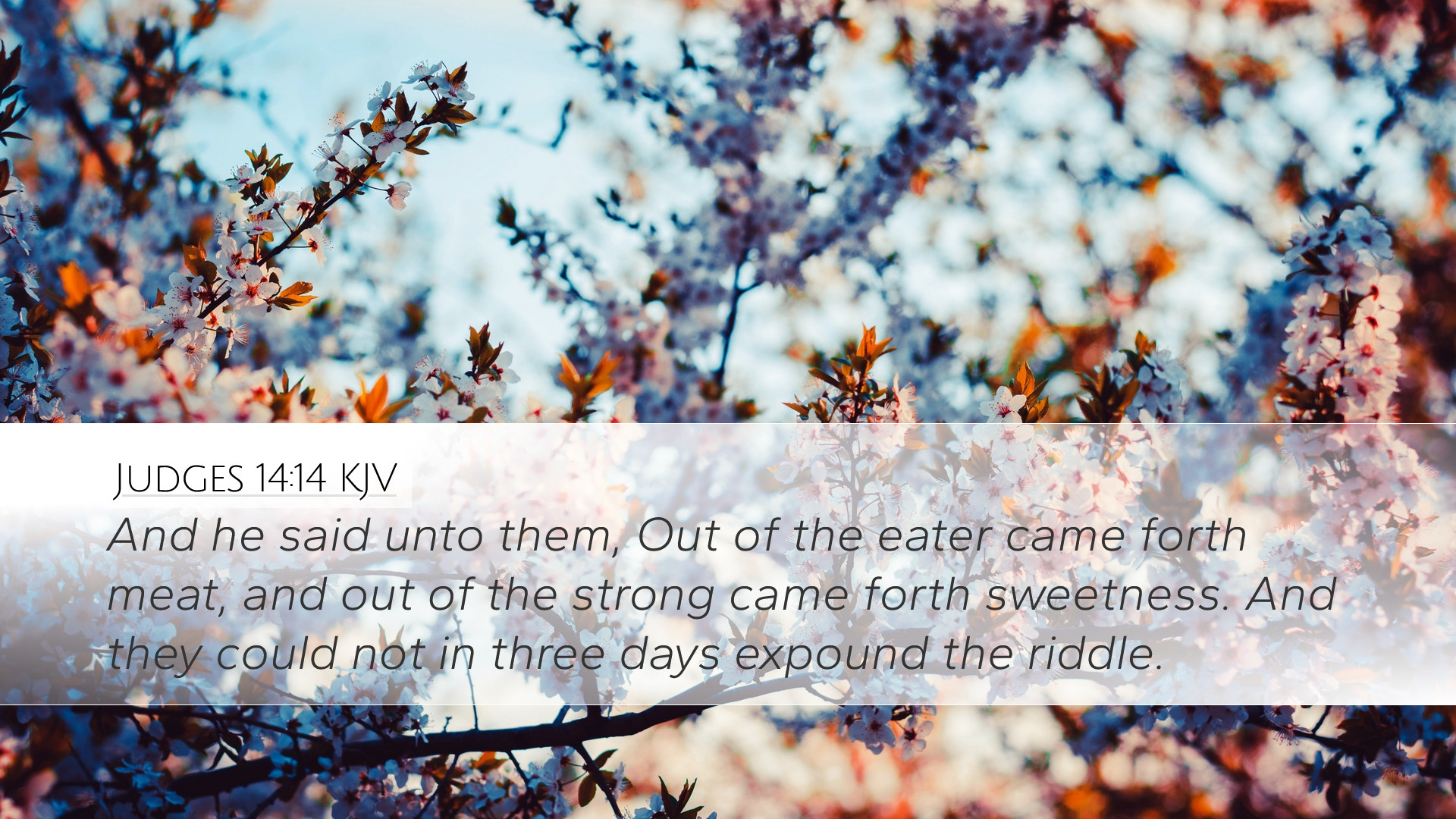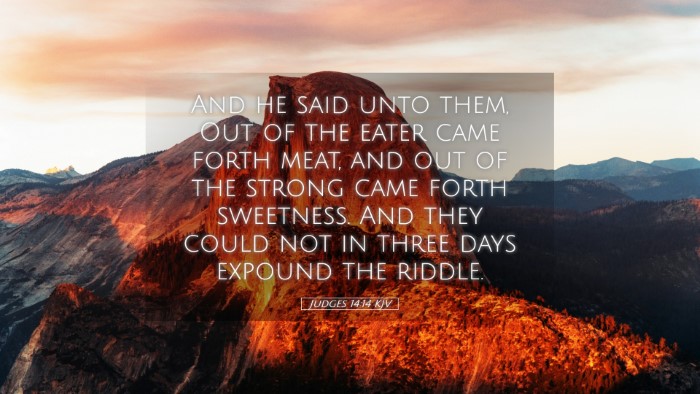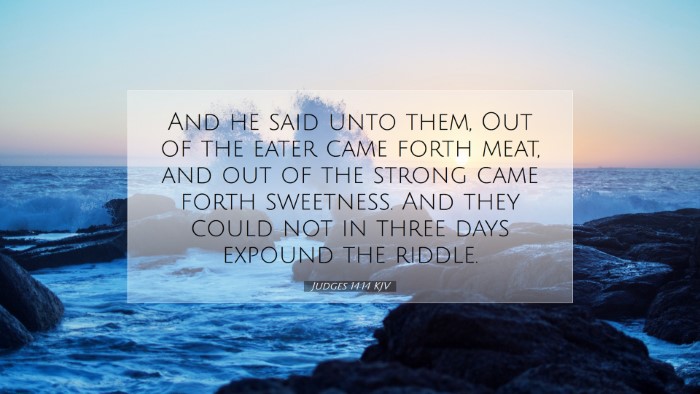Old Testament
Genesis Exodus Leviticus Numbers Deuteronomy Joshua Judges Ruth 1 Samuel 2 Samuel 1 Kings 2 Kings 1 Chronicles 2 Chronicles Ezra Nehemiah Esther Job Psalms Proverbs Ecclesiastes Song of Solomon Isaiah Jeremiah Lamentations Ezekiel Daniel Hosea Joel Amos Obadiah Jonah Micah Nahum Habakkuk Zephaniah Haggai Zechariah MalachiJudges 14:14
Judges 14:14 KJV
And he said unto them, Out of the eater came forth meat, and out of the strong came forth sweetness. And they could not in three days expound the riddle.
Judges 14:14 Bible Commentary
Commentary on Judges 14:14
Text of Judges 14:14: “And he said unto them, Out of the eater came forth meat, and out of the strong came forth sweetness. And they could not in three days expound the riddle.”
Introduction
Judges 14:14 encapsulates a key moment in the life of Samson, a figure emblematic of both strength and weakness. This verse contains a riddle that Samson posed during his wedding feast, drawing on a profound personal experience that illustrates a deeper covenantal theme. The commentary weaves insights from several esteemed biblical scholars to illuminate the significance of Samson's words and actions.
Context of the Passage
In examining Judges 14, we find Samson caught between his Nazirite calling and the influences of his surrounding culture. Here, he is entangled with a Philistine woman, which reflects his conflict with God’s command. His riddle emerges from a personal experience involving a lion he had slain and later returned to find bees and honey within its carcass. This serves as a symbol of life emerging from death, a precursor to God's redemptive narrative.
Analysis of the Riddle
1. “Out of the eater came forth meat”
- This phrase implies that something beneficial arose from something deadly. Matthew Henry notes the duality of life and death, suggesting that God can bring goodness from even dire circumstances.
- Albert Barnes emphasizes that the riddle reflects a paradox that engages the listeners, prompting them to contemplate the deeper meaning within their own lives—themes of sin and salvation.
2. “And out of the strong came forth sweetness”
- Adam Clarke comments that this part of the riddle highlights strength being transformed into something sweet, representing the sweetness of victory and God’s provision. This speaks to the transformative power of God, bringing life from death and sweetness from bitterness.
- This transformation can be perceived as a typological foreshadowing of Christ, where death brings about life, resonating with Paul’s declaration in 1 Corinthians 15:55, “O death, where is thy sting?”
Theological Implications
Samson's riddle and the surrounding circumstances present multifaceted theological themes. The riddle underscores the theme of divine sovereignty amid human folly. The Philistine men’s inability to solve the riddle for three days exemplifies humanity’s limits in comprehending God’s works.
1. The Sovereignty of God: Samson’s experiences result from God’s overarching plan despite his personal choices. Henry suggests that God’s guidance is evident even when actions seem misguided.
2. Life Through Death: The narrative in this verse portrays a recurrent biblical motif—the juxtaposition between suffering and glory. Just as life sprung from death in the case of the lion, this theme echoes throughout Scripture, culminating in Christ’s resurrection.
3. The Nature of Wisdom: The riddle invites a deeper inquiry into what it means to understand and discern wisdom. Clarke remarks that the inability of the Philistines to solve the riddle reflects a spiritual blindness, emphasizing the necessity of divine revelation to comprehend God’s mysteries fully.
Practical Applications
- Riddles of Life: Like Samson’s riddle, our life often presents paradoxes that can lead to deeper reflection on our relationship with God. This encourages believers to consider their own narratives, seeking God's design in their trials.
- God's Transformative Power: This passage urges pastors and theologians to communicate the transformative nature of God. Even in the midst of our struggles, God can birth sweetness from the strength of our challenges.
- Cultural Engagement: Samson’s connection with a Philistine woman provides a point for reflection on how believers engage with and influence their cultures, balancing their witness with God's commands.
Conclusion
The riddle found in Judges 14:14 serves as a powerful reminder of God’s sovereignty and the paradox of life that can emerge from death. As we reflect on this passage, may we aspire to discern the hidden meanings in our own lives, embracing the sweetness that God promises to those who trust in Him. Each riddle brings us closer to understanding Him, revealing the profound truths that can lead to spiritual growth and deeper faith.


